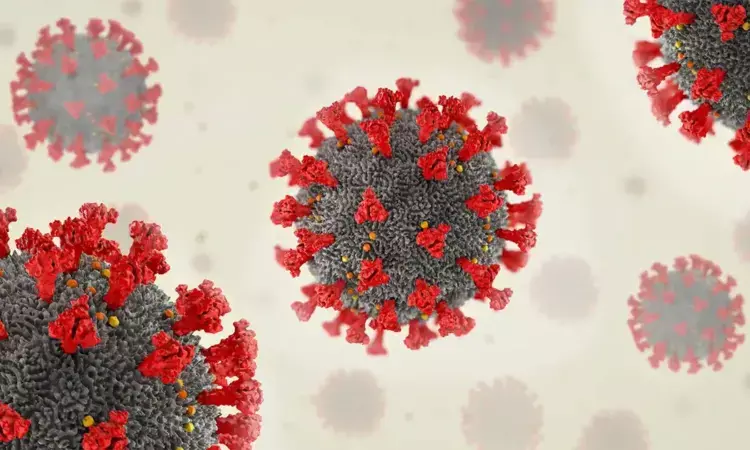- Home
- Medical news & Guidelines
- Anesthesiology
- Cardiology and CTVS
- Critical Care
- Dentistry
- Dermatology
- Diabetes and Endocrinology
- ENT
- Gastroenterology
- Medicine
- Nephrology
- Neurology
- Obstretics-Gynaecology
- Oncology
- Ophthalmology
- Orthopaedics
- Pediatrics-Neonatology
- Psychiatry
- Pulmonology
- Radiology
- Surgery
- Urology
- Laboratory Medicine
- Diet
- Nursing
- Paramedical
- Physiotherapy
- Health news
- Fact Check
- Bone Health Fact Check
- Brain Health Fact Check
- Cancer Related Fact Check
- Child Care Fact Check
- Dental and oral health fact check
- Diabetes and metabolic health fact check
- Diet and Nutrition Fact Check
- Eye and ENT Care Fact Check
- Fitness fact check
- Gut health fact check
- Heart health fact check
- Kidney health fact check
- Medical education fact check
- Men's health fact check
- Respiratory fact check
- Skin and hair care fact check
- Vaccine and Immunization fact check
- Women's health fact check
- AYUSH
- State News
- Andaman and Nicobar Islands
- Andhra Pradesh
- Arunachal Pradesh
- Assam
- Bihar
- Chandigarh
- Chattisgarh
- Dadra and Nagar Haveli
- Daman and Diu
- Delhi
- Goa
- Gujarat
- Haryana
- Himachal Pradesh
- Jammu & Kashmir
- Jharkhand
- Karnataka
- Kerala
- Ladakh
- Lakshadweep
- Madhya Pradesh
- Maharashtra
- Manipur
- Meghalaya
- Mizoram
- Nagaland
- Odisha
- Puducherry
- Punjab
- Rajasthan
- Sikkim
- Tamil Nadu
- Telangana
- Tripura
- Uttar Pradesh
- Uttrakhand
- West Bengal
- Medical Education
- Industry
High levels of two blood biomarkers may predict post-COVID brain fog

COVID-19 Case at SMCH Raises Concerns
UK: A recent study published in Nature Medicine has revealed that high levels of two blood biomarkers during infection could predict "brain fog" or cognitive dysfunction, among COVID-19 survivors 6 and 12 months after hospitalization.
"These findings provide insights into the heterogeneous biology of post-COVID cognitive deficits," Maxime Taquet, Oxford Health NHS Foundation Trust, Oxford, UK, and colleagues wrote in their study.
One in eight patients receives their first-ever psychiatric or neurological diagnosis within 6 months after COVID-19. Among these symptoms, cognitive deficits (including 'brain fog') are clinically complex, with both subjective and objective components. They are debilitating and common and can affect the ability to work, yet there is no clarity on their biological underpinnings.
Dr. Taquet conducted a prospective cohort study comprising 1,837 adults hospitalized with COVID-19. They identified two distinct biomarker profiles measured during the acute admission, which predict cognitive outcomes 6 and 12 months following COVID-19.
The team identified two profiles related to elevated levels of the biomarkers fibrinogen and D-dimer relative to CRP (C-reactive protein) in these patients who tested positive for COVID-19 in the United Kingdom from 2020 to 2021.
They collected blood samples from patients at hospital admission and gathered patient- and clinician-acquired measurements of cognition 6 and 12 months later. The patient's average age was 57.9 years, and 36.6% were women.
The researchers reported the following findings:
· Two blood-clotting protein profiles were highly correlated with persistent cognitive impairment.
· High levels of fibrinogen were correlated with both objective and subjective cognitive impairment, and high levels of D-dimer were correlated with subjective cognitive deficits such as brain fog and occupational impairment mediated by fatigue, as well as shortness of breath.
· Elevated levels of both biomarkers occurred in patients with lower-than-expected levels of CRP when levels of both are typically correlated at the cohort level.
· High D-dimer levels were linked with occupational impairment at 6 and 12 months, while fibrinogen was not.
· When subjective pre- and post-COVID cognition were compared, cognitive function had deteriorated from before infection to 6 and 12 months.
· Preexisting cognitive problems weren't tied to either biomarker profile, providing evidence that high fibrinogen or D-dimer levels relative to CRP aren't seen in people with pre-existing deficits.
· Patients with high fibrinogen levels were at greater risk of post-acute cognitive deficits, regardless of whether they had COVID-19 or a different disease.
· High D-dimer levels were linked to post-acute cognitive deficits in COVID-19 patients, who differed from other patients with high D-dimer levels in their risk of peripheral (venous blood clots) rather than central (ischemic stroke) thrombosis.
"Results were robust across secondary analyses, they were replicated, and their specificity to COVID-19 tested in a large-scale electronic health records dataset," the researchers wrote.
"These findings provide insights into the heterogeneous biology of post-COVID cognitive deficits," they concluded.
Reference:
Taquet, M., Skorniewska, Z., Hampshire, A., Chalmers, J. D., Ho, L., Horsley, A., Marks, M., Poinasamy, K., Raman, B., Leavy, O. C., Richardson, M., Elneima, O., McAuley, H. J., Shikotra, A., Singapuri, A., Sereno, M., Saunders, R. M., Harris, V. C., Greening, N. J., . . . Harrison, P. J. (2023). Acute blood biomarker profiles predict cognitive deficits 6 and 12 months after COVID-19 hospitalization. Nature Medicine, 1-11. https://doi.org/10.1038/s41591-023-02525-y
Dr Kamal Kant Kohli-MBBS, DTCD- a chest specialist with more than 30 years of practice and a flair for writing clinical articles, Dr Kamal Kant Kohli joined Medical Dialogues as a Chief Editor of Medical News. Besides writing articles, as an editor, he proofreads and verifies all the medical content published on Medical Dialogues including those coming from journals, studies,medical conferences,guidelines etc. Email: drkohli@medicaldialogues.in. Contact no. 011-43720751


